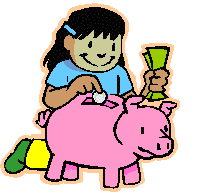According to the definition given
by the World Health Organization of Life
skills is "the ability for positive and adaptive behavior that enables
a person to deal effectively with the demands and challenges of everyday
life." Teaching the Life skills is not so tedious job, however, it can be
taught using fun lessons. The teachings of those lessons
which are much more enjoyable are more likely to be retained, for the reason
that people keep remembering the nice moments and events of life.
School Skills
During a brainstorming session good
study habits can be highlighted by creating posters. In order to do this, for
instance, divide students into groups and assign every group a poster, with
themes such as "Excellent
Study Habits" and "Techniques
to Make Learning a Fun Activity." Talk over with the students what kind
of words and pictures could be shown on the posters and then have them show the
posters to the rest of the class. Hang the posters
in the classroom, it will be beneficial for the students as they can have
glance over it whenever they can and could learn the good
skills and good
habits.
Home Skills
Doing a few of necessary
household chores what the children can do and self-care are the life
skills that can be taught in various ways that make them appear a fun
activity. Hygiene routines can be turned as games, greeting everyone in the
morning, such as singing the alphabet song every time a child washes his hands
after using the bathroom and before eating, brushing teeth before having the
bath and check if your teeth seems same as is shown in the toothpaste advertisements,
or counting the number of clothes you can fold and put away in five minutes. You
should suggest ways to enjoy a personal care or cleaning routine, such as
singing a poem while watering the plants in the balcony or the lawn, singing while
washing the dishes or dancing to music while cleaning and arranging a room.
With this kind of encouragement children won’t feel bored in keeping themselves
hygienic.
 Work
skills also keep importance as other skills. Children must know the value
of hard work and its benefits. So the teacher and parents should highlight the outcomes
of productivity and a potent work ethic by having students play a skit comparing
two different work
styles. Have one man sit and act lazy and apathetic at a desk while another
man works attentively and communicates with other workers in a friendly manner.
Show the lazy worker clambering to pass the day whereas the hard worker enjoys
everything he is getting from his work. The children will enjoy creating
workplace characters and they will also understand the values of a strong work
ethic when you tell them the benefits for those who are fully engaged in their
work.
Work
skills also keep importance as other skills. Children must know the value
of hard work and its benefits. So the teacher and parents should highlight the outcomes
of productivity and a potent work ethic by having students play a skit comparing
two different work
styles. Have one man sit and act lazy and apathetic at a desk while another
man works attentively and communicates with other workers in a friendly manner.
Show the lazy worker clambering to pass the day whereas the hard worker enjoys
everything he is getting from his work. The children will enjoy creating
workplace characters and they will also understand the values of a strong work
ethic when you tell them the benefits for those who are fully engaged in their
work.
Money Skills
 Money is also an important thing
for the present day society, so children must be good in the money management skills.
It’s not hard to develop these skills. Money skills can be learned through interactional
and fun lessons. Board
games, such as "Life", “Business”,
“Trade”, “Money Word Games”, “Change Maker”, “Counting coins” and
"Monopoly," are enjoyable means for children to learn and to deal
with money and transactions. Another significant area to dig into is
establishing a budget. For this, you can distribute catalogs of popular
products like Ben 10, Disney,
Ra.One,
Hannah
Montana Forever, Dora
the Explorer, Barbie, Winnie
the Pooh, Scooby
Doo!, Maped,
Tintin,
Tweety,
etc.,
and have the students act as if they have a definite amount of money to spend
in their funds. Let them choose the products based on that fund they do have.
It will be fun for the children and this way they will learn the money
management.
Money is also an important thing
for the present day society, so children must be good in the money management skills.
It’s not hard to develop these skills. Money skills can be learned through interactional
and fun lessons. Board
games, such as "Life", “Business”,
“Trade”, “Money Word Games”, “Change Maker”, “Counting coins” and
"Monopoly," are enjoyable means for children to learn and to deal
with money and transactions. Another significant area to dig into is
establishing a budget. For this, you can distribute catalogs of popular
products like Ben 10, Disney,
Ra.One,
Hannah
Montana Forever, Dora
the Explorer, Barbie, Winnie
the Pooh, Scooby
Doo!, Maped,
Tintin,
Tweety,
etc.,
and have the students act as if they have a definite amount of money to spend
in their funds. Let them choose the products based on that fund they do have.
It will be fun for the children and this way they will learn the money
management.




No comments:
Post a Comment